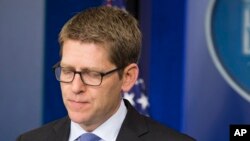WHITE HOUSE —
The White House says a potential "phased" agreement with Iran to begin addressing concerns about its nuclear program would widen the window of opportunity to resolve the issue through diplomatic means. The comments came Thursday as White House officials also responded to criticism by Israel's prime minister.
As Iranian and P5+1 negotiators continued talks in Geneva, described as tough and complex, the White House discussed in broad terms a potential "phased approach."
Spokesman Jay Carney said a first step would halt Iran's nuclear program from moving forward, and potentially roll back parts of it.
"The first step would address Iran's most advanced nuclear activities, increase transparency so Iran will not be able to use the cover of talks to advance its program, and create time and space as we negotiate a comprehensive agreement," he said.
In exchange, the P5+1 (U.S., Britain, France, Russia, China plus Germany) would consider "limited, targeted and reversible relief" that does not effect "core sanctions architecture." Such relief could involve things that could be "turned on or off" quickly, such as financial sanctions.
If Iran fails to live up to commitments, or prove in a meaningful and verifiable way that its nuclear program is exclusively for peaceful purposes, sanctions would be ratcheted up again.
Carney also addressed pressure from Congress. Legislation proposed by one Republican senator would prevent President Obama from waiving any sanctions unless Iran agrees to end uranium enrichment.
Carney said lawmakers should continue to allow a "pause" to permit the P5+1 to explore the potential of negotiations.
Senate Democratic Leader Harry Reid gave the go-ahead for a key committee to prepare a package of new sanctions, but only after the current negotiations with Iran in Geneva have ended.
The Republican-controlled House of Representatives approved a measure last July for new sanctions, but the Democratic-run Senate put off any action.
Israel's Prime Minister Benjamin Netanyahu said Thursday that the agreement on the table in Geneva would be a "mistake of historic proportions" that would allow Iran to retain capacity to make nuclear weapons.
Jay Carney repeated the White House position that "there is no daylight" between the U.S. and Israel on preventing Iran from obtaining a nuclear weapon.
When asked if President Obama would seek Mr. Netanyahu's approval before any agreement with Iran is announced Carney said the two men hold frequent discussions on Iran.
"The president, as you know, speaks regularly with Prime Minister Netanyahu, and I am sure will be speaking to him again in the near future. I don't have a planned conversation to preview for you. This is an issue that the two discuss frequently, that our counterparts discuss frequently. Again, we have an immense amount of cooperation with the Israelis on security issues, and on the challenge of Iran," Carney said.
Iran was among the topics expected to be discussed when President Obama met with a key Republican senator, John McCain, at the White House.
McCain is among lawmakers who have opposed any premature weakening of pressure on Iran in the form of economic sanctions.
As Iranian and P5+1 negotiators continued talks in Geneva, described as tough and complex, the White House discussed in broad terms a potential "phased approach."
Spokesman Jay Carney said a first step would halt Iran's nuclear program from moving forward, and potentially roll back parts of it.
"The first step would address Iran's most advanced nuclear activities, increase transparency so Iran will not be able to use the cover of talks to advance its program, and create time and space as we negotiate a comprehensive agreement," he said.
In exchange, the P5+1 (U.S., Britain, France, Russia, China plus Germany) would consider "limited, targeted and reversible relief" that does not effect "core sanctions architecture." Such relief could involve things that could be "turned on or off" quickly, such as financial sanctions.
If Iran fails to live up to commitments, or prove in a meaningful and verifiable way that its nuclear program is exclusively for peaceful purposes, sanctions would be ratcheted up again.
Carney also addressed pressure from Congress. Legislation proposed by one Republican senator would prevent President Obama from waiving any sanctions unless Iran agrees to end uranium enrichment.
Carney said lawmakers should continue to allow a "pause" to permit the P5+1 to explore the potential of negotiations.
Senate Democratic Leader Harry Reid gave the go-ahead for a key committee to prepare a package of new sanctions, but only after the current negotiations with Iran in Geneva have ended.
The Republican-controlled House of Representatives approved a measure last July for new sanctions, but the Democratic-run Senate put off any action.
Israel's Prime Minister Benjamin Netanyahu said Thursday that the agreement on the table in Geneva would be a "mistake of historic proportions" that would allow Iran to retain capacity to make nuclear weapons.
Jay Carney repeated the White House position that "there is no daylight" between the U.S. and Israel on preventing Iran from obtaining a nuclear weapon.
When asked if President Obama would seek Mr. Netanyahu's approval before any agreement with Iran is announced Carney said the two men hold frequent discussions on Iran.
"The president, as you know, speaks regularly with Prime Minister Netanyahu, and I am sure will be speaking to him again in the near future. I don't have a planned conversation to preview for you. This is an issue that the two discuss frequently, that our counterparts discuss frequently. Again, we have an immense amount of cooperation with the Israelis on security issues, and on the challenge of Iran," Carney said.
Iran was among the topics expected to be discussed when President Obama met with a key Republican senator, John McCain, at the White House.
McCain is among lawmakers who have opposed any premature weakening of pressure on Iran in the form of economic sanctions.








